- Home
- Pittacus Lore
I Am Number Four: The Lost Files: Nine’s Legacy
I Am Number Four: The Lost Files: Nine’s Legacy Read online
I Am Number Four
The Lost Files
NINE’S LEGACY
THE LORIEN LEGACIES
Pittacus Lore
Contents
Cover
Title Page
Chapter One
Chapter Two
Chapter Three
Chapter Four
Chapter Five
Chapter Six
Chapter Seven
Chapter Eight
Chapter Nine
Chapter Ten
Chapter Eleven
Chapter Twelve
Chapter Thirteen
Chapter Fourteen
Chapter Fifteen
Chapter Sixteen
Chapter Seventeen
Chapter Eighteen
Chapter Nineteen
Chapter Twenty
Chapter Twenty-one
Chapter Twenty-two
Chapter Twenty-three
Chapter Twenty-four
An Excerpt from I Am Number Four: The Lost Files: Six’s Legacy
Chapter One
Chapter Two
Back Ads
About the Author
Also by Pittacus Lore
Copyright
About the Publisher
Chapter One
There are rules for hiding in plain sight. The first rule, or at least the one that Sandor repeats most often, is “Don’t be stupid.”
I’m about to break that rule by taking off my pants.
Spring in Chicago is my favorite season. The winters are cold and windy, the summers hot and loud, the springs perfect. This morning is sunny, but there’s still a forbidding chill in the air, a reminder of winter. Ice-cold spray blows in off Lake Michigan, stinging my cheeks and dampening the pavement under my sneakers.
I jog all eighteen miles of the lakefront path every morning, taking breaks whenever I can, not because I need them, but to admire the choppy gray-blue water of Lake Michigan. Even when it’s cold, I always think about diving in, of swimming to the other side.
I fight the urge just like I fight the urge to keep pace with the neon spandex cyclists that zip past. I have to go slow. There are more than two million people in this city and I’m faster than all of them.
Still, I have to jog.
Sometimes, I make the run twice to really work up a sweat. That’s another one of Sandor’s rules for hiding in plain sight: always appear to be weaker than I actually am. Never push it.
It’s dumb to complain. We’ve been in Chicago for five years thanks to Sandor’s rules. Five years of peace and quiet. Five years since the Mogadorians last had a real bead on us.
Five years of steadily increasing boredom.
So when a sudden vibration stirs the iPod strapped to my upper arm, my stomach drops. The device isn’t supposed to react unless trouble is near.
I take just a moment to decide on what I do next. I know it’s a risk. I know it flies against everything I’ve been told to do. But I also know that risks are worth it; I know that sometimes you have to ignore your training. So I jog to the side of the runner’s path, pretending that I need to work out a cramp. When I’m finished stretching, I unsnap the tear-away track pants I’ve been rocking every jog since we moved to Chicago and stuff them into my pack. Underneath I’m wearing a pair of mesh shorts, red and white like the St. Louis Cardinals, enemy colors here in Chicago.
But Cards colors in Cubs territory are nothing to worry about compared to the three scars ringing my ankle. Baseball rivalries and bloody interplanetary vendettas just don’t compare.
My low socks and running shoes do little to hide the scars. Anyone nearby could see them, although I doubt my fellow runners are in the habit of checking out each other’s ankles. Only the particular runner I’m trying to attract today will really notice.
When I start jogging again, my heart is beating way harder than normal. Excitement. It’s been a while since I felt anything like this. I’m breaking Sandor’s rule and it’s exhilarating. I just hope he isn’t watching me through the city’s police cameras that he’s hacked into. That would be bad.
My iPod rumbles again. It’s not actually an iPod. It doesn’t play any music and the earbuds are just for show. It’s a gadget that Sandor put together in his lab.
It’s my Mogadorian detector. I call it my iMog.
The iMog has its limitations. It picks out Mogadorian genetic patterns in the immediate area, but only has a radius of a few blocks and is prone to interference. It’s fueled by Mogadorian genetic material, which has a habit of rapidly decaying; so it’s no surprise that the iMog can get a little hinky. As Sandor explains it, the device is something we received when we first arrived from Lorien, from a human Loric friend. Sandor has spent considerable time trying to modify it. It was his idea to encase it in an iPod shell as a way to avoid attention. There’s no track list or album art on my iMog’s screen—just a solitary white dot against a field of black. That’s me. I’m the white dot. The last time we tuned it up was after the most recent time we were attacked, scraping Mogadorian ash off our clothes so Sandor could synthesize it or stabilize it or some scientific stuff I only half paid attention to. Our rule is that if the iMog sounds off, we get moving. It’s been so long since it’s activated itself that I’d started to worry that the thing had gone dead.
And then, during my run a couple days ago, it went off. One solitary red dot trolling the lakefront. I hustled home that day, but I didn’t tell Sandor what had happened. At best, there’d be no more runs on the lakefront. At worst, we’d be packing up boxes. And I didn’t want either of those things to happen.
Maybe that’s when I first broke the “don’t be stupid” rule. When I started keeping things from my Cêpan.
The device is now vibrating and beeping because of the red dot that’s fallen into step a few yards behind me. Vibrating and beeping in tune with my accelerated heartbeat.
A Mogadorian.
I hazard a glance over my shoulder and have no trouble picking out which jogger is the Mog. He’s tall, with black hair shaved close to the scalp, and is wearing a thrift-store Bears sweatshirt and a pair of wraparound sunglasses. He could pass for human if he wasn’t so pale, his face not showing any color even in this brisk air.
I pick up my pace but don’t bother trying to get away. Why make it easy on him? I want to see whether this Mog can keep up.
By the time I exit the lakefront and head for home, I realize I might have been a little cocky. He’s good—better than I expect him to be. But I’m better. Still, as I pick up speed, I feel my heart racing from exertion for the first time in as long as I can remember.
He’s gaining on me, and my breaths are getting shorter. I’m okay for now, but I won’t be able to keep this up forever. I double-check the iMog. Luckily my stalker hasn’t called in backup. It’s still just the one red dot. Just us.
Tuning out the noise of the city around us—yuppie couples headed to brunch, happy tourist families cracking jokes about the wind—I focus on the Mog, using my naturally enhanced hearing to listen to his breathing. He’s getting winded too; his breathing is ragged now. But his footsteps are still in sync with my own. I listen for anything that sounds like him going for a communicator, ready to break into a sprint if he sends out an alert.
He doesn’t. I can feel his eyes boring into my back. He thinks that I haven’t noticed him.
Smug, exhausted, and dumb. He’s just what I’d been hoping for.
The John Hancock Center rises above us. The sun blinks off the skyscraper’s thousand windows. One hundred stories and, at the top, my home.
The Mog hesitates as I breeze throug
h the front door, then follows. He catches up to me as I cross the lobby. Even though I’d been expecting it, I stiffen when I feel the cold barrel of a small Mogadorian blaster pressed between my shoulder blades.
“Keep walking,” he hisses.
Although I know he can’t hurt me while I’m protected by the Loric charm, I play along. I let him think he’s in control.
I smile and wave at the security guards manning the front desk. With the Mog dogging my heels, we climb into the elevator.
Alone at last.
The Mog keeps his gun aimed at me as I hit the button for the 100th floor. I’m more nervous than I thought I’d be. I’ve never been alone with a Mog before. I remind myself that everything is going just as I planned it. As the elevator begins its ascent, I act as casual as I can.
“Did you have a nice run?”
The Mog grabs me around the throat and slams me against the wall of the elevator. I brace myself to have the wind knocked out of me. Instead, a warm sensation runs down my back and it’s the Mog who stumbles backward, gasping.
The Loric charm at work. I’m always surprised at how well it works.
“So you aren’t Number Four,” he says.
“You’re quick.”
“Which are you?”
“I could tell you.” I shrug. “I don’t see what it would matter. But I’ll let you guess.”
He eyes me, sizing me up, trying to intimidate me. I don’t know what the rest of the Garde are like, but I don’t scare that easy. I take off the iMog, laying it gently on the floor. If the Mog finds this unusual, he doesn’t let on. I wonder what the prize is for capturing a Garde. “I may not know your number, but I know you can look forward to a life of captivity while we kill the rest of your friends. Don’t worry,” he adds, “it won’t be long.”
“Good story,” I reply, glancing up at the elevator panel. We’re almost at the top.
I dreamed about this moment last night. Actually, that’s not quite right. I couldn’t sleep last night, too keyed up for what was to come. I fantasized about this moment.
I make sure to savor my words.
“Here’s the thing,” I tell him. “You’re not making it out of here alive.”
Chapter Two
Before the Mog can react, I punch a series of buttons on the elevator panel. It’s a sequence of buttons that no one in the tower would ever have reason to push, a sequence that Sandor programmed to initiate the security measures he installed into the elevator.
The elevator vibrates. The trap is activated.
My iMog floats off the floor and, with a metallic clang, sticks to the back wall of the elevator. Before the Mog can blink, he’s flung backward too, pulled by the blaster in his hand and whatever other metal objects he might be hiding in his pockets. With a crunch, his hand is pinned between his blaster and the wall. He cries out.
Did he really think we wouldn’t have protected our home?
The powerful magnet Sandor installed in the elevator is just one of the fail-safes my Cêpan secretly built into the John Hancock Center. I’ve never seen the magnet work as intended before, but I’ve definitely screwed around with it enough. I’ve spent hours with the elevator door wedged open, the magnet on, trying to bounce nickels from across the penthouse and get them to stick to the walls. Like I said, things have been kind of boring lately.
It was a good game until the tenants on the lower levels started complaining.
The Mog tries to wiggle his fingers—which are most certainly broken now—from underneath the blaster to no avail. He tries to kick at me, but I just laugh and hop away. That’s the best he can do?
“What is this?” he cries.
Before I can answer, the elevator doors hiss open and there is Sandor.
I’ve never understood my Cêpan’s affinity for expensive Italian suits. They can’t be comfortable. Yet here he is, not even noon on a Saturday morning, and he’s already dressed to the nines. His beard is freshly trimmed, clipped close. His hair is slicked back perfectly.
It’s like Sandor was expecting company. I wonder if he was watching my run on the lakefront, and my stomach drops at the thought.
I’m going to be in deep trouble.
Sandor is twisting a silencer into the barrel of a sleek 9mm. He glances at me, his expression inscrutable, then stares hard at the Mog.
“Are you alone?”
The Mog jerks against the magnet again.
“He’s alone,” I answer.
Sandor shoots me a look, and then pointedly repeats his question.
“You expect me to answer that?” snarls the Mog.
I can tell Sandor is pissed. But the Mog’s answer causes a glimmer of humor to flash in my Cêpan’s eyes. Sandor’s mouth twitches, like he’s fighting a laugh. I’ve sat through enough of my Cêpan’s beloved James Bond movie collection to know this Mog just provided a perfect one-liner opportunity.
“No,” Sandor says. “I expect you to die.”
Sandor raises the gun before looking at me again.
“You brought him here,” he says. “Your kill.”
I swallow hard. I planned this whole thing out. It’s been all I could think about since that red dot appeared on my iMog a couple days ago. Still, I’ve never killed one before. I don’t feel sympathy for the bastard. It’s not that at all. But this feels like a big deal. Taking a life, even if it is only a Mogadorian. Will it change me?
Whatever. I grab for Sandor’s gun, but he yanks it away.
“Not like that,” he says, and drops the gun.
I don’t let it hit the ground. My telekinesis developed last month and we’ve been practicing with it ever since.
I take a deep breath, focusing my mind, steeling myself. I levitate the gun until it is level with the Mog’s head. He sneers at me.
“You don’t have the ba—”
With my mind, I squeeze the trigger.
The gun releases a muffled thwip. The bullet strikes the Mog right between the eyes. Seconds later, he’s a pile of ash on the elevator floor.
Sandor plucks the gun out of the air. I can tell he’s studying me, but I can’t take my eyes off the remains of the Mogadorian.
“Clean that mess up,” says Sandor. “Then, we need to talk.”
Chapter Three
I clean up what remains of the Mog as quickly as I can, not wanting to deal with building security wondering what’s keeping the elevator. I scoop some of the ash into a plastic sandwich bag for Sandor. He might want it for one of his experiments.
For some reason, my hands won’t stop shaking.
I figure it’s because I’m rushing, that the shaking will stop once I’m done cleaning the elevator, but it doesn’t. It only gets worse. I stagger out of the elevator into the living room of our penthouse, and collapse onto a white suede couch.
Yes, I killed the Mog. Yes, it was even easier than I thought it would be. But it didn’t feel how I thought it would. Something could have gone wrong.
I can’t shake the feeling of that Mog’s fingers on my throat. Even though he couldn’t hurt me, the sensation lingers. As the adrenaline drains away, all I can think about is what a stupid idea it was to engage the Mog. I’d wanted some action. I tried to be suave like the spies in those Bond movies. I think I put up a good front, not that the Mog will ever be able to tell anyone how badass I acted.
My head swims as I gaze up at the gold chandelier that presides over the living room. I put this whole place at risk. Everything we’ve amassed in our years of safety, our home. Most importantly, Sandor himself. I don’t feel like celebrating; I feel like puking.
Even now, Sandor could be packing our bags. We could be headed back on the road.
Before Chicago, all we did was travel. It was always hotels and motels. Sandor never wanted to put down roots. He’s not much of a housekeeper—doesn’t cook or clean—our needs were fulfilled by grouchy maids and room service. We spent a couple months at the Ritz-Carlton in Aspen. I learned to ski. Sandor spent his ti
me charming snow bunnies next to the fire. We spent some time in South America, eating the best steaks in the world. Our cover story was always the same as it is here in Chicago: Sandor is a day trader who hit a hot streak and now lives comfortably, and I’m his latchkey nephew.
I liked Aspen. It was good to be outdoors without having to worry about a crush of people and which ones might be hostile aliens.
After Aspen it was a roach motel on the outskirts of Denver. I learned to judge how safe Sandor thought we were by the luxuriousness of our accommodations. Although we could afford to live anywhere, thanks to the precious gems the nine Cêpans had left Lorien with, nice hotels meant Sandor thought we were safe enough to live it up a little; flea-bitten rattraps meant it was more important to lie low. If I’m being honest, I liked that place too. That was where Sandor tinkered with the vibrating bed, making it powerful enough to almost toss me to the ceiling.
We moved whenever the hotel staff got to know us too well. As soon as we became a fixture, it was time to move on.
That never helped. The Mogs always caught up with us.
The last stop before Chicago was at a trucker motel in Vancouver. I still don’t know how we got away that time. It was bad. Five Mogs took us by surprise there. Sandor had built weapons to keep us safe—flash bombs to blind the Mogs, a remote-control helicopter with a very real gun attached—and still we were almost overwhelmed. Sandor got slashed by one of their daggers during the fight and barely had the strength to drive us south to White Rock. There, I sat by his bedside for a week while he slipped in and out of consciousness, his fever bad enough that I thought he might have set the sheets on fire if they weren’t so soaked with his sweat.
When he came to, Sandor decided there’d be no more running.
“We’re going to try something different,” he told me. “We’ve got the money. Might as well use it.”
I didn’t know what he meant.
“We’re going to hide in plain sight.”
And we used the money. The two-floor penthouse Sandor purchased in the John Hancock Center is like something out of that reality TV show where the celebrities show off their glamorous houses.

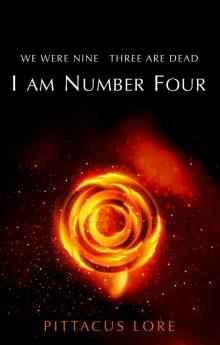 I Am Number Four
I Am Number Four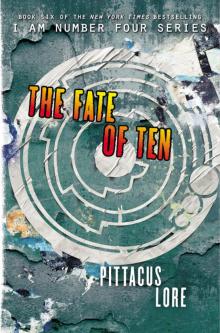 The Fate of Ten
The Fate of Ten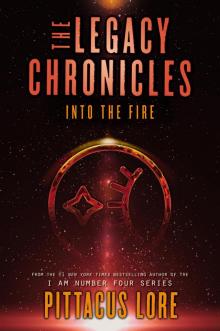 The Legacy Chronicles - Into the Fire
The Legacy Chronicles - Into the Fire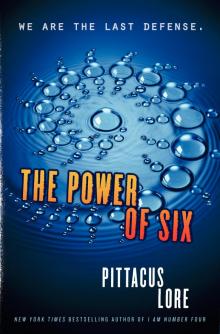 The Power of Six
The Power of Six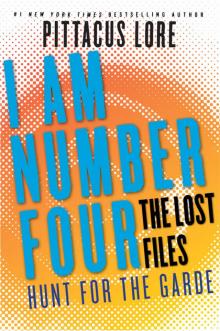 Hunt for the Garde
Hunt for the Garde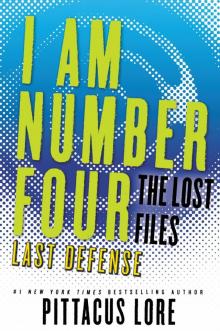 Last Defense
Last Defense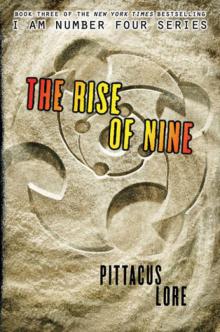 The Rise of Nine
The Rise of Nine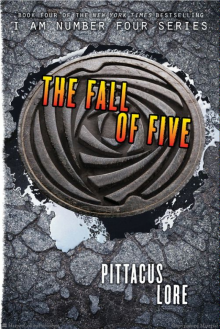 The Fall of Five
The Fall of Five The Fugitive
The Fugitive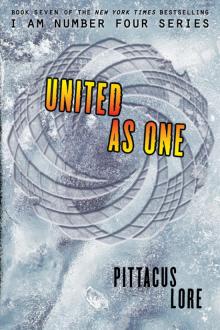 United as One
United as One Ashfall Legacy
Ashfall Legacy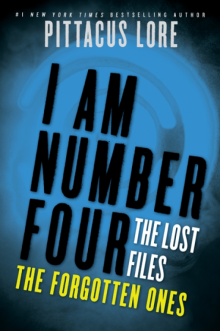 The Forgotten Ones
The Forgotten Ones Fugitive Six
Fugitive Six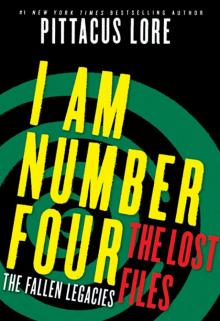 The Fallen Legacies
The Fallen Legacies![[Lorien Legacies 04.95] The Lost Files: Five's Betrayal Read online](http://i1.bookreadfree.com/28/lorien_legacies_04_95_the_lost_files_fives_betrayal_preview.jpg) [Lorien Legacies 04.95] The Lost Files: Five's Betrayal
[Lorien Legacies 04.95] The Lost Files: Five's Betrayal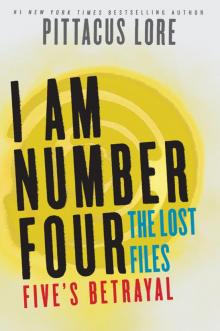 Five's Betrayal
Five's Betrayal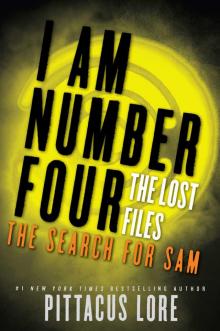 The Search for Sam
The Search for Sam![[Lorien Legacies 04.85] The Lost Files: The Forgotten Ones Read online](http://i1.bookreadfree.com/28/lorien_legacies_04_85_the_lost_files_the_forgotten_ones_preview.jpg) [Lorien Legacies 04.85] The Lost Files: The Forgotten Ones
[Lorien Legacies 04.85] The Lost Files: The Forgotten Ones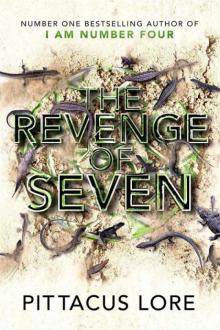 The Revenge of Seven
The Revenge of Seven![[Lorien Legacies 06.3] The Lost Files: Hunt for the Garde Read online](http://i1.bookreadfree.com/07/lorien_legacies_06_3_the_lost_files_hunt_for_the_garde_preview.jpg) [Lorien Legacies 06.3] The Lost Files: Hunt for the Garde
[Lorien Legacies 06.3] The Lost Files: Hunt for the Garde![[Lorien Legacies 04.0] The Fall of Five Read online](http://i1.bookreadfree.com/03/lorien_legacies_04_0_the_fall_of_five_preview.jpg) [Lorien Legacies 04.0] The Fall of Five
[Lorien Legacies 04.0] The Fall of Five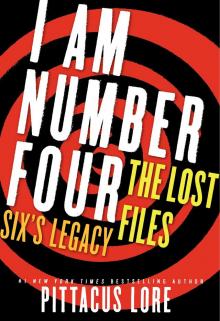 Nines Legacy
Nines Legacy Generation One LLR
Generation One LLR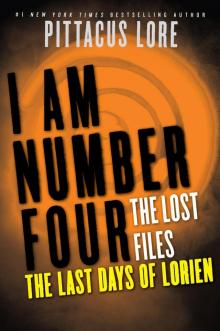 The Last Days of Lorien
The Last Days of Lorien![[Lorien Legacies 05.1] The Lost Files: The Fugitive Read online](http://i1.bookreadfree.com/i/03/14/lorien_legacies_05_1_the_lost_files_the_fugitive_preview.jpg) [Lorien Legacies 05.1] The Lost Files: The Fugitive
[Lorien Legacies 05.1] The Lost Files: The Fugitive![[Lorien Legacies 06.0] The Fate of Ten Read online](http://i1.bookreadfree.com/07/lorien_legacies_06_0_the_fate_of_ten_preview.jpg) [Lorien Legacies 06.0] The Fate of Ten
[Lorien Legacies 06.0] The Fate of Ten![[Lorien Legacies 06.2] The Lost Files: Last Defense Read online](http://i1.bookreadfree.com/08/lorien_legacies_06_2_the_lost_files_last_defense_preview.jpg) [Lorien Legacies 06.2] The Lost Files: Last Defense
[Lorien Legacies 06.2] The Lost Files: Last Defense![[Lorien Legacies 04.9] The Lost Files: Five's Legacy Read online](http://i1.bookreadfree.com/i/03/16/lorien_legacies_04_9_the_lost_files_fives_legacy_preview.jpg) [Lorien Legacies 04.9] The Lost Files: Five's Legacy
[Lorien Legacies 04.9] The Lost Files: Five's Legacy The Navigator
The Navigator![[Lorien Legacies 04.94] The Lost Files: Return to Paradise Read online](http://i1.bookreadfree.com/i/03/13/lorien_legacies_04_94_the_lost_files_return_to_paradise_preview.jpg) [Lorien Legacies 04.94] The Lost Files: Return to Paradise
[Lorien Legacies 04.94] The Lost Files: Return to Paradise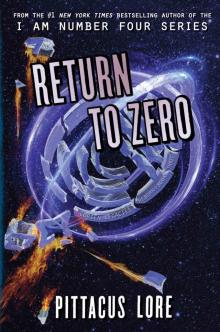 Return to Zero
Return to Zero![[Lorien Legacies 01.5] The Lost Files: The Fallen Legacies Read online](http://i1.bookreadfree.com/09/lorien_legacies_01_5_the_lost_files_the_fallen_legacies_preview.jpg) [Lorien Legacies 01.5] The Lost Files: The Fallen Legacies
[Lorien Legacies 01.5] The Lost Files: The Fallen Legacies![[Lorien Legacies 05.7] The Lost Files: The Guard Read online](http://i1.bookreadfree.com/i/03/13/lorien_legacies_05_7_the_lost_files_the_guard_preview.jpg) [Lorien Legacies 05.7] The Lost Files: The Guard
[Lorien Legacies 05.7] The Lost Files: The Guard![[Lorien Legacies 06.1] The Lost Files: Legacies Reborn Read online](http://i1.bookreadfree.com/i/03/13/lorien_legacies_06_1_the_lost_files_legacies_reborn_preview.jpg) [Lorien Legacies 06.1] The Lost Files: Legacies Reborn
[Lorien Legacies 06.1] The Lost Files: Legacies Reborn![[Lorien Legacies 03.0] The Rise of Nine Read online](http://i1.bookreadfree.com/10/lorien_legacies_03_0_the_rise_of_nine_preview.jpg) [Lorien Legacies 03.0] The Rise of Nine
[Lorien Legacies 03.0] The Rise of Nine![[Lorien Legacies 02.0] The Power of Six Read online](http://i1.bookreadfree.com/i/03/14/lorien_legacies_02_0_the_power_of_six_preview.jpg) [Lorien Legacies 02.0] The Power of Six
[Lorien Legacies 02.0] The Power of Six![[Lorien Legacies 04.6] The Lost Files: The Search for Sam Read online](http://i1.bookreadfree.com/i/03/17/lorien_legacies_04_6_the_lost_files_the_search_for_sam_preview.jpg) [Lorien Legacies 04.6] The Lost Files: The Search for Sam
[Lorien Legacies 04.6] The Lost Files: The Search for Sam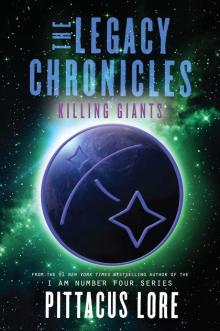 The Legacy Chronicles: Killing Giants
The Legacy Chronicles: Killing Giants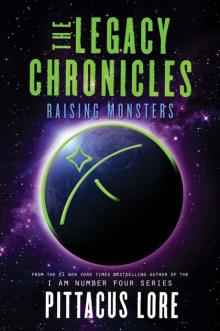 The Legacy Chronicles: Raising Monsters
The Legacy Chronicles: Raising Monsters![[Lorien Legacies 05.4] The Lost Files: The Navigator Read online](http://i1.bookreadfree.com/i/03/17/lorien_legacies_05_4_the_lost_files_the_navigator_preview.jpg) [Lorien Legacies 05.4] The Lost Files: The Navigator
[Lorien Legacies 05.4] The Lost Files: The Navigator![[Lorien Legacies 07.0] United as One Read online](http://i1.bookreadfree.com/i/03/18/lorien_legacies_07_0_united_as_one_preview.jpg) [Lorien Legacies 07.0] United as One
[Lorien Legacies 07.0] United as One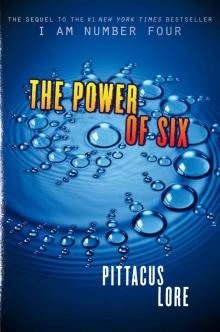 The Power of Six (I Am Number Four)
The Power of Six (I Am Number Four)![[Lorien Legacies 03.5] The Lost Files: Nine's Legacy Read online](http://i1.bookreadfree.com/i/03/18/lorien_legacies_03_5_the_lost_files_nines_legacy_preview.jpg) [Lorien Legacies 03.5] The Lost Files: Nine's Legacy
[Lorien Legacies 03.5] The Lost Files: Nine's Legacy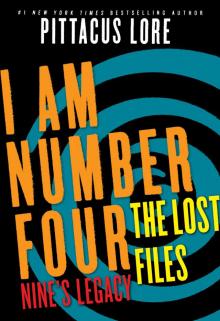 I Am Number Four: The Lost Files: Nine’s Legacy
I Am Number Four: The Lost Files: Nine’s Legacy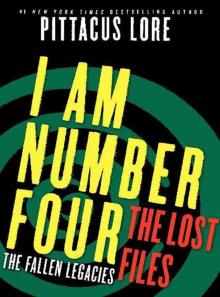 The Lost Files: The Fallen Legacies (i am number four)
The Lost Files: The Fallen Legacies (i am number four)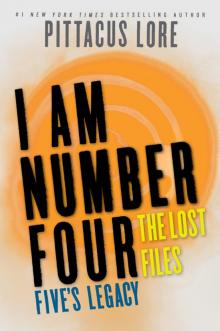 Five's Legacy
Five's Legacy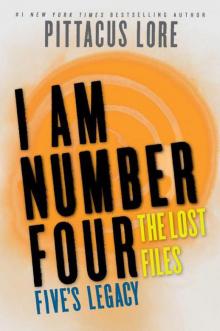 I Am Number Four: The Lost Files: Five's Legacy
I Am Number Four: The Lost Files: Five's Legacy![[Lorien Legacies 05.0] The Revenge of Seven Read online](http://i1.bookreadfree.com/i1/03/30/lorien_legacies_05_0_the_revenge_of_seven_preview.jpg) [Lorien Legacies 05.0] The Revenge of Seven
[Lorien Legacies 05.0] The Revenge of Seven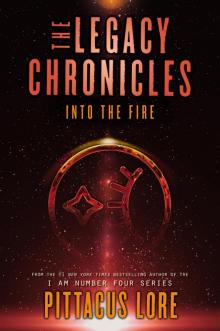 The Legacy Chronicles
The Legacy Chronicles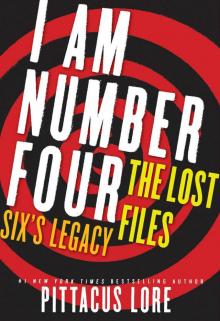 The Lost Files: Six's Legacy
The Lost Files: Six's Legacy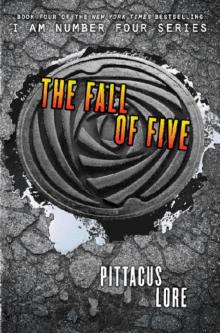 The Fall of Five (I Am Number Four)
The Fall of Five (I Am Number Four)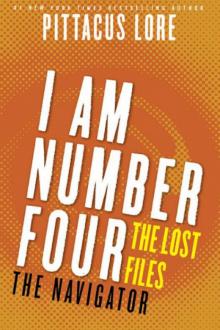 The Lost Files: The Navigator
The Lost Files: The Navigator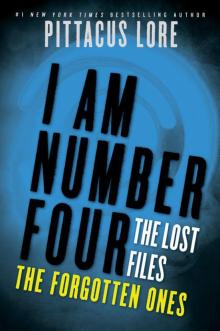 I Am Number Four: The Lost Files: The Forgotten Ones
I Am Number Four: The Lost Files: The Forgotten Ones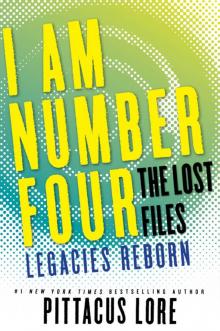 Legacies Reborn
Legacies Reborn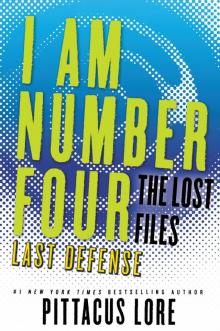 I Am Number Four: The Lost Files: Last Defense
I Am Number Four: The Lost Files: Last Defense The Legacy Chronicles_Up in Smoke
The Legacy Chronicles_Up in Smoke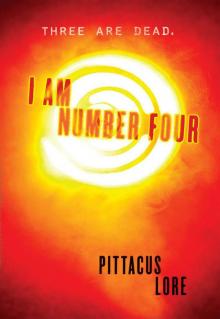 I Am Number Four ll-1
I Am Number Four ll-1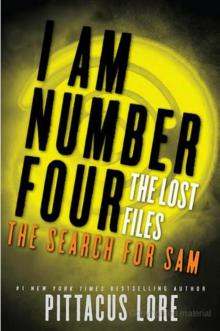 The Search for Sam lltlf-4
The Search for Sam lltlf-4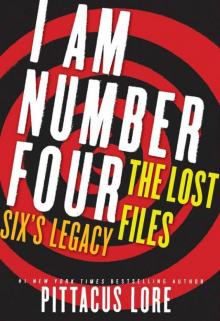 The Lost Files: Six's Legacy (lorien legacies)
The Lost Files: Six's Legacy (lorien legacies)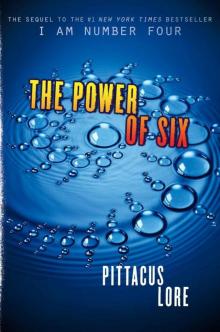 The Power of Six tll-2
The Power of Six tll-2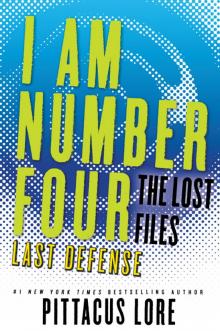 I Am Number Four: The Lost Files #14
I Am Number Four: The Lost Files #14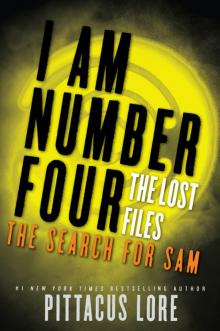 I Am Number Four: The Lost Files: The Search for Sam
I Am Number Four: The Lost Files: The Search for Sam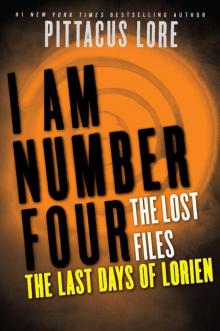 I Am Number Four: The Lost Files: The Last Days of Lorien
I Am Number Four: The Lost Files: The Last Days of Lorien